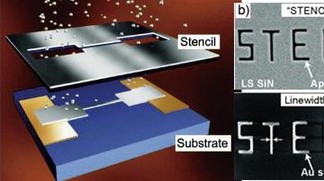Sep 10 2014
Congratulations to Oscar Vazquez-Mena, Shenqi Xie and Guillermo Villanueva who co-authored a review paper about stencil lithography "Resistless nanofabrication by stencil lithography: A review" recently published on Microelectronic Engineering.
 © 2014 EPFL
© 2014 EPFL
We present a review on stencil lithography and focus on the particular interest and challenges when applying it to the scalable fabrication of nm-size devices. We first describe the basic technique with its main advantages and challenges. Then we review the key results of stencil lithography in nanoscale patterning for the direct deposition of complex materials and the patterning on non-conventional substrates. In particular we discuss the blurring, which is a major limitation to achieving high pattern resolution in stencil lithography. Successful strategies to reduce the blurring based on etching processes and novel stencil designs are presented. Moreover, the paper presents the use of stencil masks beyond deposition, namely for localized etching and ion implantation processes. We also review the current state in research of dynamic stencil lithography, which is based on displacing the stencils with respect to the substrate during deposition. The paper concludes by presenting a broad range of applications for stencil lithography that benefit from the resistless fabrication. The fabricated nano-systems range from plasmonics and gratings for solar cells, electrical contacts for 2-D materials, transistor fabrication on planar and non-planar substrates, to magnetic nanostructures, plasmonic biosensing, cell and protein patterning, flexible devices, as well as the fabrication of NIL stamps and mass sensors integrated with CMOS.
Source: http://www.epfl.ch/